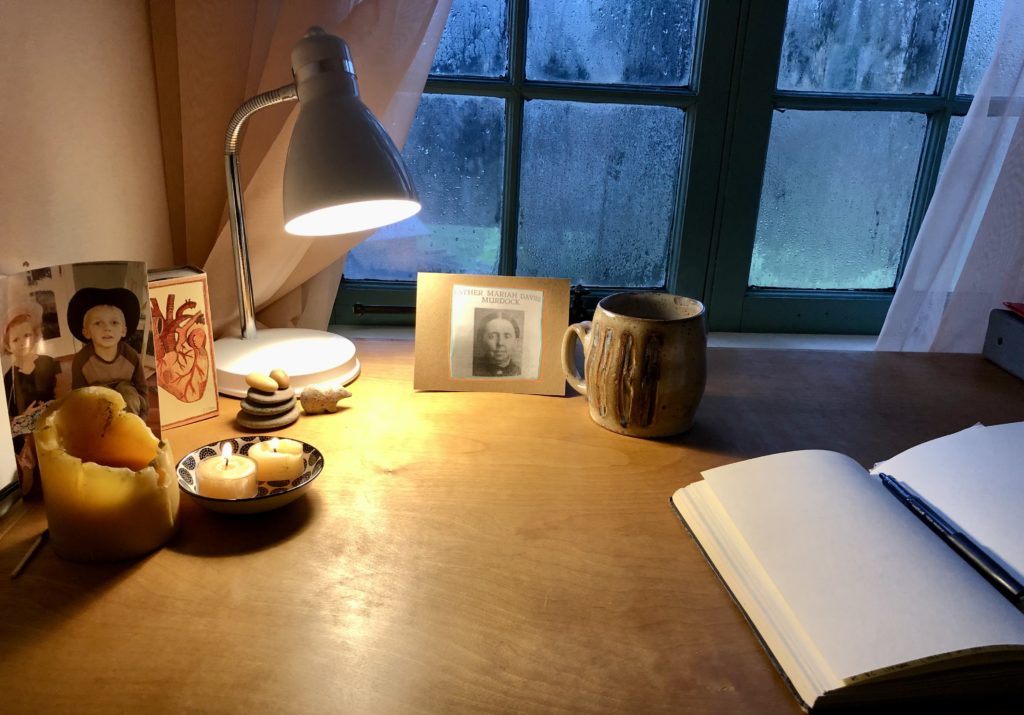Poetry vs. War, plus a curious chicken
First, two announcements:
Hodge & I are the featured readers at the upcoming Lake Oswego Author series, Tuesday March 15th. It’s an online event, so you can register here and attend from anywhere in the world, in your soft pants on a couch. We’ll read from our book, Loaners: The Making of a Street Library, and answer questions.
Also, I’m teaching “Experiments With the Letter: Clarity, Catharsis & Rest Through the Epistolary Form,” for Lewis & Clark College. We’ll meet on the first and last Saturdays in April, (April 2 and April 30), and challenge ourselves to write 30 letters/postcards in 30 days. It will be held on zoom, but with plenty of off-screen time for writing and reflection. I would love to see you there.
Today I am writing from the The Rice Place, a hand-built rammed-earth house on ten acres, stone’s throw from the Clackamas River. I have holed up for a week with two fellow writers to work on our respective projects. We write in silence until 1 o’clock, then have lunch together and talk about our mornings. Afternoons are for walks, naps, letter-writing, and chicken encounters*.
If it feels wrong to go dark/offline for a week when so much calamity is unfolding in the world, it also feels essential. As my friend Sarah Sentilles writes, it’s worth remembering what we have no control over (politicians, corporations, governments, viruses) and what we can control. We have power over what we write and dream and imagine. Though it may feel like paying attention to a thing is doing something, Sarah suggests that too much attention to news and its horrors can result in a kind of distraction that “make it hard to dream up alternatives to the present reality.” She goes on:
To take back your focus – to make art – is a radical act. To take all of that scattered energy and send it in a single direction is no small thing. It is revolutionary to take back your mind, your energy, your focus, your inner emotional landscape, to put whatever it is that you call sacred at the centre of your life.
“Creation Stories: The World-Making Power of Art,” – Sarah Sentilles
So this week I am dedicated to taking back my mind, to practice making art, but I’ll leave you with one poem. I keep wishing that the poet Wisława Szymborska was in charge of everything right now and that all wars and rumors of wars could be suspended, tanks and rockets and humans frozen in place while she reads her poem aloud, (through a global megaphone?) “The End and the Beginning.” A Polish poet who won the Nobel Prize in Literature in 1996, she writes:
After every war
someone has to tidy up.
Things won’t
straighten themselves up, after all.
Someone has to push the rubble
to the side of the road,
so the corpse-filled wagons
can pass.
Someone has to get mired
in scum and ashes,
sofa springs,
splintered glass,
and bloody rags.
Someone has to drag in a girder
to prop up a wall.
Someone has to glaze a window,
rehang a door.
Photogenic it’s not,
and takes years.
All the cameras have left
for another war.
We’ll need the bridges back,
and new railway stations.
Sleeves will go ragged
from rolling them up.
Someone, broom in hand,
still recalls the way it was.
Someone else listens
and nods with unsevered head.
But already there are those nearby
starting to mill about
who will find it dull.
From out of the bushes
sometimes someone still unearths
rusted-out arguments
and carries them to the garbage pile.
Those who knew
what was going on here
must make way for
those who know little.
And less than little.
And finally as little as nothing.
In the grass that has overgrown
causes and effects,
someone must be stretched out
blade of grass in his mouth
gazing at the clouds.
from Miracle Fair, 2001, translated by Joanna Trzeiack
________________________________________________________________________________________

*there are 6 chickens on the property and one of them stood in front of me expectantly yesterday until I bent to scoop her up – I think she’s a Golden Laced Wyandotte, beautiful golden feathers, which she allowed me to stroke, and a bright eye which she turned on me. I think I could turn and live with animals/they are so placid and self-contain’d/I stand and look at them long and long.. Later I will go and find her again.